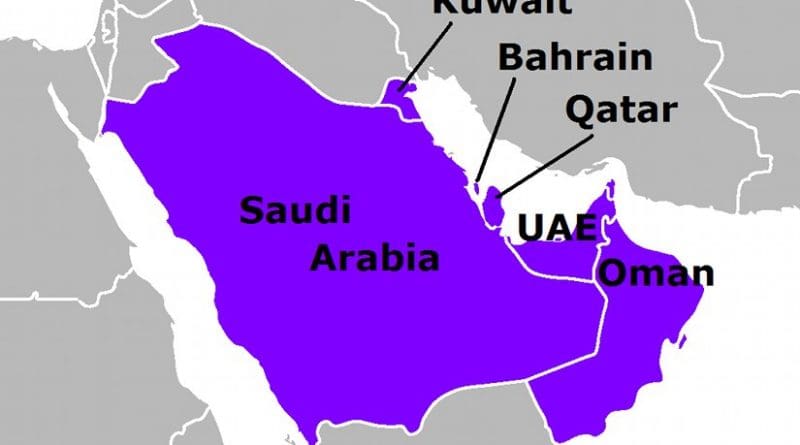The Debacle At GCC Summit – OpEd
Since its inception in 1981, Gulf Cooperation Council has been an umbrella for the countries in the gulf region to foster socio-economic, cultural and security cooperation. Moreover, the fact cannot be denied that the tiny Petro-monarchies of the Arabian Peninsula have always been under severe threat from the resurgent state and non-state actors. For instance, the invasion of Kuwait by Iraq under Saddam Hussein’s regime in the 1990s has further intensified the need of retrospective security measures in the region. And, it is often been said that without the existence of GCC, the tiny Petro-monarchies would have no status in the Middle East.
Every year, the Gulf countries gather for the GCC summit to discuss geopolitical and security affairs in the region. This year, the summit was held in Saudi Arabia’s capital Riyadh on Oct 10, which is the leading member of GCC. The summit was eye grabbing and at once controversial because beside special invitation from the Saudi crown prince Muhammad bin Salman, the ruler of Qatar, Sheikh Hammad bin Khalifa al Thani boycotted the Summit. The boycott occurred amidst of the ongoing sea, land and air blockade on Qatar imposed in June 2017, by Saudi Arabia, Bahrain, UAE, and non-GCC member Egypt. The blockade was justified with severe allegation on Qatar of sponsoring terrorism, and fake news through its global media network, Al Jazeera.
The ruler of Qatar has denied the allegation calling it false flag to breach the Qatar’s sovereignty. With this resentment and pretention, the emir of Qatar refrained from the recent summit, instead a delegation led by Sultan bin Saad al Murikhi, the foreign minister of Qatar was sent to attend the summit.
Though, it does not come as surprise to aggressive GCC bloc, which severed diplomatic ties with Qatar but for Crown Prince Muhammad bin Salman, it might have alluded a red signal that Qatar is no more a pawn in the gulf chessboard. On the contrary, the foreign ministers of other GCC countries lambasted the emir of Qatar for not accepting the invitation especially the foreign minister of Bahrain, who tweeted with utter regret, he said: “It would have been preferred for the emir of Qatar to accept the earnest invitation and the summit”.
Likewise, with the same parallel voice, all foreign ministers of GCC members called on Qatar to change its policy in order to forge the negotiation to lift the blockade by accepting demands. In contrast, the same kind of blockade was imposed on Qatar in 2014 by the same countries but was resolved at the summit that year but this time it seems that there is a complete fall-out among the GCC members.
Furthermore, the burning topics of the recent summit were security issues, Oil politics, Yamen war, Iranian activities, and indeed the blockade on Qatar. However, the absence of the ruler of Qatar has sabotaged the morale of other GCC member because this time Qatar has delivered a clear message in the off the cuff remarks that it is not going to compromise on its sovereignty. As soon as the blockade was imposed, the other regional hegemons, Turkey and Iran came to rescue Qatar even President Erdogan threatened to land its army if the GCC countries attempted to invade the country.
Consequently, on the onset of this debacle Qatar has also announced in defiance that it is going to leave the OPEC cartel, by January 2019. Qatar was the first country that joined OPEC in the 1960s and now it is the first country to leave. According to Qatar’s energy minister Saad al Kaabi, his country will quit the oil cartel by Jan 2019 to focus on the gas production.
Moreover, Qatar is the leading exporter of liquified natural gas encompassing second largest gas reserves after Russia.
Although, the sudden departure of Qatar from OPEC will not upshot its production because Qatar generates less than 2% in the Cartel’s output, but it will upshot the geopolitics of the Middle East for the years to come.
By forging new alliance with Turkey and Iran, which have always been antagonist to the Saudi-led camp, Qatar will become a biggest threat for the other Petro-monarchies. Recently, the murder episode of Saudi Journalist Jamal Khashoggi inside Saudi consulate in Turkey has further deteriorated the diplomatic relationship between Turkey and Saudi Arabia. Because, President Erdogan blamed Saudi crown prince for the murder and with this excuse Turkey outraged the Saudi position in the region.
Thus, with these rapid political developments in the region, the recent GCC summit resulted in complete failure—except oil politics and Yamen war, there was no serious discussion about the solution of major disputes in the gulf region that clearly shows the dying position of GCC because the eagle has grown too much old in the desert.
*Shahzada Rahim is a postgraduate student with keen interest of writing on history, geopolitics, Current affairs, and International political economy.

